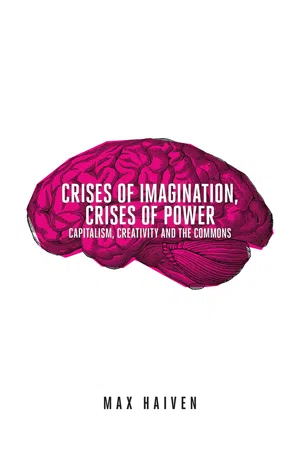
- English
- ePUB (mobile friendly)
- Available on iOS & Android
eBook - ePub
About this book
Today, when it seems like everything has been privatized, when austerity is too often seen as an economic or political problem that can be solved through better policy, and when the idea of moral values has been commandeered by the right, how can we re-imagine the forces used as weapons against community, solidarity, ecology and life itself?
In this stirring call to arms, Max Haiven argues that capitalism has colonized how we all imagine and express what is valuable. Looking at the decline of the public sphere, the corporatization of education, the privatization of creativity, and the power of finance capital in opposition to the power of the imagination and the growth of contemporary social movements, Haiven provides a powerful argument for creating an anti-capitalist commons. Capitalism is not in crisis, it is the crisis, and moving beyond it is the only key to survival.
Crucial reading for all those questioning the imposition of austerity and hoping for a fairer future beyond it.
In this stirring call to arms, Max Haiven argues that capitalism has colonized how we all imagine and express what is valuable. Looking at the decline of the public sphere, the corporatization of education, the privatization of creativity, and the power of finance capital in opposition to the power of the imagination and the growth of contemporary social movements, Haiven provides a powerful argument for creating an anti-capitalist commons. Capitalism is not in crisis, it is the crisis, and moving beyond it is the only key to survival.
Crucial reading for all those questioning the imposition of austerity and hoping for a fairer future beyond it.
Frequently asked questions
Yes, you can cancel anytime from the Subscription tab in your account settings on the Perlego website. Your subscription will stay active until the end of your current billing period. Learn how to cancel your subscription.
No, books cannot be downloaded as external files, such as PDFs, for use outside of Perlego. However, you can download books within the Perlego app for offline reading on mobile or tablet. Learn more here.
Perlego offers two plans: Essential and Complete
- Essential is ideal for learners and professionals who enjoy exploring a wide range of subjects. Access the Essential Library with 800,000+ trusted titles and best-sellers across business, personal growth, and the humanities. Includes unlimited reading time and Standard Read Aloud voice.
- Complete: Perfect for advanced learners and researchers needing full, unrestricted access. Unlock 1.4M+ books across hundreds of subjects, including academic and specialized titles. The Complete Plan also includes advanced features like Premium Read Aloud and Research Assistant.
We are an online textbook subscription service, where you can get access to an entire online library for less than the price of a single book per month. With over 1 million books across 1000+ topics, we’ve got you covered! Learn more here.
Look out for the read-aloud symbol on your next book to see if you can listen to it. The read-aloud tool reads text aloud for you, highlighting the text as it is being read. You can pause it, speed it up and slow it down. Learn more here.
Yes! You can use the Perlego app on both iOS or Android devices to read anytime, anywhere — even offline. Perfect for commutes or when you’re on the go.
Please note we cannot support devices running on iOS 13 and Android 7 or earlier. Learn more about using the app.
Please note we cannot support devices running on iOS 13 and Android 7 or earlier. Learn more about using the app.
Yes, you can access Crises of Imagination, Crises of Power by Max Haiven in PDF and/or ePUB format, as well as other popular books in Art & Art & Politics. We have over one million books available in our catalogue for you to explore.
Information
Table of contents
- Cover
- About The Author
- Title
- Copyright
- Contents
- Acknowledgements
- Introduction: Crises of the imagination
- One: Reimagining value
- Two: Publics, commons, occupations
- Three: The crisis of the financialized imagination
- Four: Within and beyond the edu-factory
- Five: The enclosure of history, the debt of the past, the commons of memory
- Six: The enclosure of creativity
- Seven: What is the radical imagination?
- Conclusion: Fatalism and its discontents
- Notes
- Bibliography
- Index